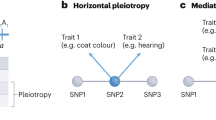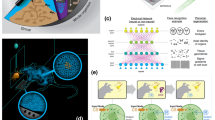Abstract
Replying to: R. McElreath, B. Luttbeg, S. P. Fogarty, T. Brodin & A. Sih Nature 450, doi:10.1038/nature06326 (2007)
The evolution of animal personalities is still poorly understood. The emergence of consistent individual differences is relatively easy to envisage when initial differences in behaviour are reinforced by positive feedback mechanisms. Such reinforcement might act through learning or training, or through behaviour-induced changes in an individual’s condition1 or environment2. However, positive feedback is not required. We showed that, even without such feedback, differences in fitness expectations result in consistent differences in risk-taking behaviour3. This was illustrated by a model that, for simplicity, considers a short life history. McElreath et al.4 argue that our results extend to long-lived organisms only under specific conditions. Although we agree that the full scope and limitations of our model still have to be mapped out, we believe that our arguments are also relevant to long-lived organisms.
This is a preview of subscription content, access via your institution
Access options
Subscribe to this journal
Receive 51 print issues and online access
$199.00 per year
only $3.90 per issue
Buy this article
- Purchase on Springer Link
- Instant access to full article PDF
Prices may be subject to local taxes which are calculated during checkout
Similar content being viewed by others
References
Rands, S. A., Cowlishaw, G., Pettifor, R. A., Rowcliffe, J. M. & Johnstone, R. A. Spontaneous emergence of leaders and followers in foraging pairs. Nature 423, 432–434 (2003)
Hemelrijk, C. K. & Wantia, J. Individual variation by self-organisation. Neurosci. Biobehav. Rev. 29, 125–136 (2005)
Wolf, M., van Doorn, G. S., Leimar, O. & Weissing, F. J. Life-history trade-offs favour the evolution of animal personalities. Nature 447, 581–584 (2007)
McElreath, R., Luttbeg, B., Fogarty, S. P., Brodin, T. & Sih, A. Evolution of animal personalities. Nature 450 10.1038/nature06326 (2007)
Clark, C. W. Antipredator behavior and the asset-protection principle. Behav. Ecol. 5, 159–170 (1994)
Williams, G. C. Natural selection, the costs of reproduction, and a refinement of Lack’s principle. Am. Nat. 100, 687–690 (1966)
Ens, B. J., Weissing, F. J. & Drent, R. H. The despotic distribution and deferred maturity: two sides of the same coin. Am. Nat. 146, 625–650 (1995)
Field, J., Cronin, A. & Bridge, C. Future fitness and helping in social queues. Nature 441, 214–217 (2006)
Author information
Authors and Affiliations
Rights and permissions
About this article
Cite this article
Wolf, M., van Doorn, G., Leimar, O. et al. Wolf et al. reply. Nature 450, E5–E6 (2007). https://doi.org/10.1038/nature06327
Issue Date:
DOI: https://doi.org/10.1038/nature06327
This article is cited by
-
Models of pace-of-life syndromes (POLS): a systematic review
Behavioral Ecology and Sociobiology (2018)
-
Stress response varies with plumage colour and local habitat in feral pigeons
Journal of Ornithology (2016)
Comments
By submitting a comment you agree to abide by our Terms and Community Guidelines. If you find something abusive or that does not comply with our terms or guidelines please flag it as inappropriate.



